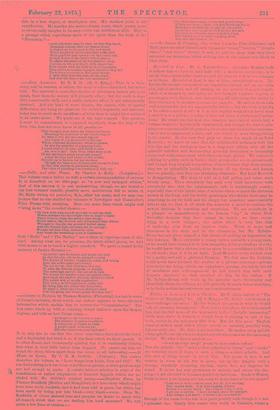Revealed at Last. By A. Eubule-Evans. (London: Bentley.)—It is seldom
that we have to find fault with a novel for its brevity ; it is rarely that a story-teller could not tell his story as well in two volumes as in three. Revealed at Lust is one of these exceptional cases. Mr. Eubule-Evans has constructed an ingenious, though not an agreeable plot, fall of incident, and all turning on one central idea, not compli- cated or weakened by underplot ; he has brought together a group of personages, each distinct, some interesting, all indicating the ability to draw character, to produce persons, not puppets. He makes them talk well occasionally, and act energetically always ; but the book is hardly to he called a novel at all : it is to the regular worked-out novel what a sketch is to a picture, a thing of dots and lines, of strokes and indica- tions. He crams into the first two chapters materials of which half a volume might be legitimately constructed, and though we regard spin- ning-out as an unjustifiable practice, we are not sure that undue condensa- tion is not as unpleasant a fault, and one which is more disappointing to the reader. In the very first page we learn too much about Lord Keswick ; we know at once that the cold-blooded nobleman with the thin lips and the steel-grey eyes is a desperate villain, with all the splendid intellect and far-reaching personal fascination so invariably' connected with remorseless wickedness in high places. We confess to a liking for guilty earls in books ; their accessories are so picturesque, and though they commit tremendous crimes because they want money, they are so splendidly lavish, they break all the divine and human laws so grandly, that they are charming criminals. Bat Lord Keswick is disappointing. His story is told at a full gallop, and takes one's breath away. Than everybody has such very brief interviews with everybody else, that the epigrammatic talk is tantalisingly scanty; especially that of the infidel man of science who is so much the cleverest person in the book, and the feeble gentleman who thinks there may be something to say for faith and the clergy, but somehow unaccountably fails to say it; that it all reads like notes for a novel to combine the newest fashions in sensation and scepticism. We see everybody in a glimpse as unsatisfactory as the famous " sip " in which Dick Swiveller declares that beer cannot be tasted ; we hear every- thing in a swift whisper ; the entire effect is very like that of landscape seen from an express train. There is some red
cleverness in the story and in the characters, but Mr. Eabule- Evans has not given himself a fair chance of making an impression in this instance. Ho is evidently a young writer, probably a young man, or he would have learned to he lose unsparing in his portraiture of evil ; he would know that a picture can no more he a resemblance to life if it be all shade, than if it be all light. Lord Keswick is too wicked even for a guilty earl and a gartered Premier. We feel sure his lordship could never have retained the service of a private secretary—private secretaries not being, within our experience, persons absolutely devoid of manliness and self-respect—if he had treated him with such despotic insolence as that ascribed to him by the author. If Mr. Eubnle-Evans will work up his material more thoroughly and plentifully dilute his villains, he will probably do much better next time, as he lacks neither inventiveness nor constructiveness.


































 Previous page
Previous page